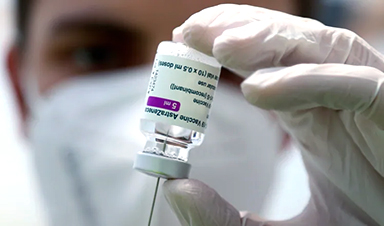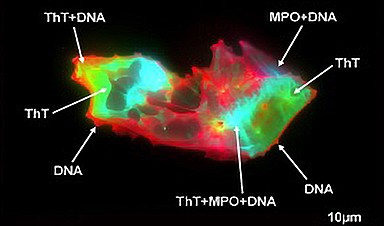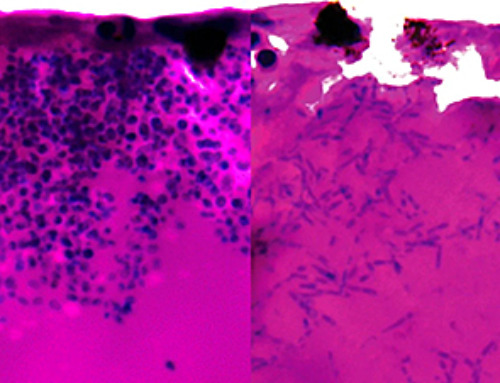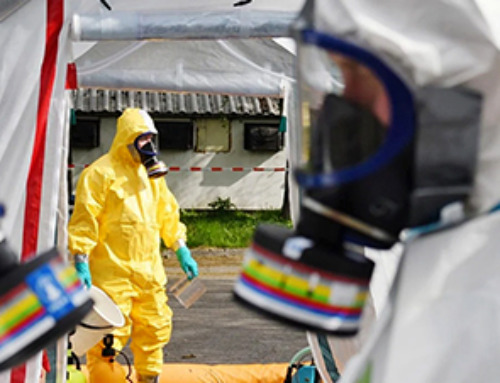WHO data suggests richer countries have so far received 87 per cent of doses globally.
Waiving patents on COVID-19 vaccines would remove “a legal hurdle” to companies and developing countries producing the shots and fixing a global supply problem, says an advocate with Oxfam Canada.
“It allows them to produce it without having to worry about being taken to court or having other kinds of financial or punitive measures lobbied at them for infringing patents,” said Siham Rayale, Oxfam Canada’s policy and advocacy lead on humanitarian and refugee issues.
Oxfam is among organizations supporting India and South Africa’s call for the World Trade Organization (WTO) to temporarily suspend patents and intellectual property (IP) rules on vaccines, for the course of the pandemic.
Data from the World Health Organization, released earlier this month, suggests richer countries have so far received 87 per cent of COVID-19 vaccines, with low-income countries receiving just 0.2 per cent. That waiver would allow countries to “rapidly scale up vaccine manufacturing and production,” Rayale told The Current’s Matt Galloway.
The call to suspend the Trade-Related Aspects of Intellectual Property Rights (TRIPS) agreement is backed by dozens of developing countries, but has not received support from some G7 countries since it was initially proposed last October.
With another meeting about the issue scheduled for this week, a group of 170 former heads of state and Nobel laureates wrote to U.S. President Joe Biden this month, urging him to waive U.S. intellectual property rules and support the proposal at the WTO. The White house said Tuesday that a decision has not been reached.
In Canada, the federal government insists it “has not rejected the waiver proposal,” but still has questions, and is committed to finding “consensus-based solutions.”
Speaking to The Current in February, Microsoft co-founder Bill Gates said he didn’t believe an IP waiver would solve the supply problem.
“It’s about these factories being exactly right and passing strict regulatory review,” said Gates, who has donated $1.75 billion to the fight against COVID-19.
“There are very few high quality vaccine factories in the world. And IP is not the issue.”
Rayale disagreed, saying “you don’t have to go far to look for manufacturing capacity to be able to produce vaccines, particularly in the global south.”
She said there are facilities in Morocco, Algeria, Tunisia, Senegal and Egypt that are already producing other vaccines and could pivot to COVID-19 shot production.
South Africa has already provided details of these and other options to the WTO, she said.
“All it takes is investment in existing infrastructure that can be repurposed to make COVID-19 vaccines,” she said.
She also dismissed the argument that removing IP protection would discourage companies from investing in vaccines, reiterating that the waiver is temporary.
Several companies also received billions in public money to develop COVID-19 vaccines, she added, but much of the profits will go to company shareholders, not back to the public purse.
Removing protection will hamper collaboration: expert
Andrei Iancu, the former director of the U.S. Patent and Trademark Office, argued that removing patent protection “would slow down vaccine distribution.”
Patents have allowed companies to enter into international collaborations in developing and producing vaccines, said Iancu, a partner at the law firm Irell & Manella, in California.
“Major competitors are collaborating: Johnson & Johnson and Merck, Pfizer and Novartis,” he told Galloway.
“Without IP, these companies would be much more reluctant to enter into these collaboration agreements.”
Under TRIPS, signatory countries can issue compulsory licences that allow someone else to produce patented products, if it’s deemed necessary to the public interest, Iancu said.
He argued countries aren’t issuing those licences because the vaccines aren’t easy to produce without the input of the original manufacturer.
He also warned that without protection, companies “retreat into their trade-secrets shells,” which slows progress via a lack of collaboration.
Iancu noted that roughly 10 billion doses of COVID-19 vaccines are expected to be produced by the end of the year.
“Before disrupting this incredibly complex intellectual property system … we need to be really sure that we know exactly what we’re doing here and we have the evidence that A, it’s necessary and B, it actually will solve the problems,” he said.
Export restrictions slowing distribution
Removing patents and IP protections won’t solve the vaccine supply problem on its own, said Gian Gandhi of UNICEF, who acts as coordinator for COVAX, the global initiative aimed at ensuring equitable distribution of COVID-19 vaccines
“It’s not really a patent issue that’s stopping the scale of production, but actually forms of vaccine nationalism either to keep vaccines within borders, or to keep the components necessary for producing them within borders,” he told Galloway.
The E.U., the U.S. and India have all imposed export restrictions on vaccines, as they try to manage low supply and rising outbreaks on their own territory.
Until every country in the world has a high vaccination rate, the virus has the opportunity “to both replicate and frankly mutate,” Gandhi said.
“Even a fully vaccinated population in a high-income country may be at risk from variants that evade the current vaccines,” he said.
“Increasing the levels of coverage in developing countries makes sense both abroad, but certainly at home for the wealthier countries.”
News
AI Helped Scientists Stop a Virus With One Tiny Change
Using AI, researchers identified one tiny molecular interaction that viruses need to infect cells. Disrupting it stopped the virus before infection could begin. Washington State University scientists have uncovered a method to interfere with a key [...]
Deadly Hospital Fungus May Finally Have a Weakness
A deadly, drug-resistant hospital fungus may finally have a weakness—and scientists think they’ve found it. Researchers have identified a genetic process that could open the door to new treatments for a dangerous fungal infection [...]
Fever-Proof Bird Flu Variant Could Fuel the Next Pandemic
Bird flu viruses present a significant risk to humans because they can continue replicating at temperatures higher than a typical fever. Fever is one of the body’s main tools for slowing or stopping viral [...]
What could the future of nanoscience look like?
Society has a lot to thank for nanoscience. From improved health monitoring to reducing the size of electronics, scientists’ ability to delve deeper and better understand chemistry at the nanoscale has opened up numerous [...]
Scientists Melt Cancer’s Hidden “Power Hubs” and Stop Tumor Growth
Researchers discovered that in a rare kidney cancer, RNA builds droplet-like hubs that act as growth control centers inside tumor cells. By engineering a molecular switch to dissolve these hubs, they were able to halt cancer [...]
Platelet-inspired nanoparticles could improve treatment of inflammatory diseases
Scientists have developed platelet-inspired nanoparticles that deliver anti-inflammatory drugs directly to brain-computer interface implants, doubling their effectiveness. Scientists have found a way to improve the performance of brain-computer interface (BCI) electrodes by delivering anti-inflammatory drugs directly [...]
After 150 years, a new chapter in cancer therapy is finally beginning
For decades, researchers have been looking for ways to destroy cancer cells in a targeted manner without further weakening the body. But for many patients whose immune system is severely impaired by chemotherapy or radiation, [...]
Older chemical libraries show promise for fighting resistant strains of COVID-19 virus
SARS‑CoV‑2, the virus that causes COVID-19, continues to mutate, with some newer strains becoming less responsive to current antiviral treatments like Paxlovid. Now, University of California San Diego scientists and an international team of [...]
Lower doses of immunotherapy for skin cancer give better results, study suggests
According to a new study, lower doses of approved immunotherapy for malignant melanoma can give better results against tumors, while reducing side effects. This is reported by researchers at Karolinska Institutet in the Journal of the National [...]
Researchers highlight five pathways through which microplastics can harm the brain
Microplastics could be fueling neurodegenerative diseases like Alzheimer's and Parkinson's, with a new study highlighting five ways microplastics can trigger inflammation and damage in the brain. More than 57 million people live with dementia, [...]
Tiny Metal Nanodots Obliterate Cancer Cells While Largely Sparing Healthy Tissue
Scientists have developed tiny metal-oxide particles that push cancer cells past their stress limits while sparing healthy tissue. An international team led by RMIT University has developed tiny particles called nanodots, crafted from a metallic compound, [...]
Gold Nanoclusters Could Supercharge Quantum Computers
Researchers found that gold “super atoms” can behave like the atoms in top-tier quantum systems—only far easier to scale. These tiny clusters can be customized at the molecular level, offering a powerful, tunable foundation [...]
A single shot of HPV vaccine may be enough to fight cervical cancer, study finds
WASHINGTON -- A single HPV vaccination appears just as effective as two doses at preventing the viral infection that causes cervical cancer, researchers reported Wednesday. HPV, or human papillomavirus, is very common and spread [...]
New technique overcomes technological barrier in 3D brain imaging
Scientists at the Swiss Light Source SLS have succeeded in mapping a piece of brain tissue in 3D at unprecedented resolution using X-rays, non-destructively. The breakthrough overcomes a long-standing technological barrier that had limited [...]
Scientists Uncover Hidden Blood Pattern in Long COVID
Researchers found persistent microclot and NET structures in Long COVID blood that may explain long-lasting symptoms. Researchers examining Long COVID have identified a structural connection between circulating microclots and neutrophil extracellular traps (NETs). The [...]
This Cellular Trick Helps Cancer Spread, but Could Also Stop It
Groups of normal cbiells can sense far into their surroundings, helping explain cancer cell migration. Understanding this ability could lead to new ways to limit tumor spread. The tale of the princess and the [...]





















